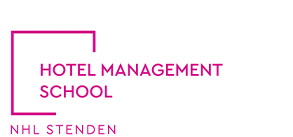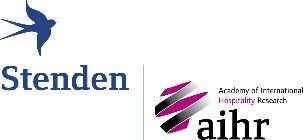
-
 publication: 10 October 2017
publication: 10 October 2017
CALL FOR PAPERS AND PRESENTATIONS
HOSPITALITY STUDIES - AIHR ANNUAL CONFERENCE 2018
HOSPITABLENESS OUTSIDE OF THE BOX: SLAVERY AND LIBERATION IN HOTELS
Stenden Hotel Management School and the Academy of International Hospitality Research (AIHR) invite researchers, research-students and practitioners to submit a paper presentation for the annual conference on Tuesday 27th & Wednesday 28th March 2018 in Stenden Hotel, Leeuwarden, The Netherlands. All accepted papers that are presented on the conference (also work-in-progress at that time) will be published in the Research in Hospitality Management journal volume 8, issue 2, November 2018. Please submit an extended abstract describing the presentation (and the paper) ultimately December 20th, 2018 to Professor Conrad Lashley, conrad.lashley@stenden.com.
CALL FOR PAPERS
Day One: Slavery and Neo-slavery in Hotels
The International Labour Organisation estimates that there are 21 million people in various forms of slavery across the globe today. Even countries that supposedly made the practice illegal in the 19th Century have not completely eradicated the vile process of enslaving the weak and vulnerable. The Anti-Slavery Society estimates that some 30,000 people in contemporary Britain are enslaved. Internationally, a considerable number of the enslaved are forced to work in the hotel sector, and although this is less likely in Western countries, many slaves are employed in the hotel supply chain such as working on farms, and in sub-contracted laundry services, etc.
Apart from those who are formally enslaved, there are tens of thousands of low-paid workers in hotels. Low pay and limited personal resources ensure that the working experience in hotels is slave-like. Financial rewards are barely enough to survive, and few have resources that they can fall back upon when unforeseen problems arise. Many have to work in settings where they are unable resist the power of the employer. In some cases, workers from overseas have their passports held by the manager. In all cases, trade union membership is low and opportunities for collective resistance are limited. The power is very much in the hands of the employer.
Keynote speakers and research papers will explore the themes of slavery and neo-slavery on this first day.
Day Two: Workers Control and Cooperatives in Hotels
The second day of the program explores the ownership and control of hotels by the workforce. There is a distinction between “workers’ owned” and “workers’ controlled” organisations. In the first case, businesses are owned and individuals pay a ‘buy-in’ fee when they start working in the organisations. At the end of the year they share in the surpluses made by selling the services provided. Workers’ control may not involve collective ownership but involvement in electing board members and votes on key policy issues, etc. Typically these would not include a management role, though in some cases co-ordination roles are shared around the workforce.
The development of cooperatives, workers’ ownership, and workers’ control are responses to the exploitative nature of capitalism. Zero hours’ contracts, under-payment for hours worked, or minimum wage levels that are below the ‘living wage’ all result in exploitation. The Living Wage Foundation claims that in the UK the hourly minimum wage is typically 10 to 16 per cent below the ‘living wage’. By taking on ownership and establishing more control of decision-making and policy-formation, the workforce shapes decisions that benefit them, and increases their benefits from the workplace. In some cases, more democratic decision-making practices allow policy development that benefits both the experience of working in hotels and shares in the profits generated. Empowering the workforce can also be a management technique that produces better service quality, improved customer and employee satisfaction, and reduced staff turnover.
Keynote speakers and research papers will explore the themes of the living wage as well as worker ownership and control on this second day.
First draft papers to be submitted by 20th December 2017.
Submit to:
Conrad Lashley
Stenden Hotel Management School
Stenden University
Rengerslaan 8,
P.O. Box 1298,
8900CG, Leeuwarden
The Netherlands
![]()

![]()

|
|
|
|
|




 Back to overview
Back to overview

